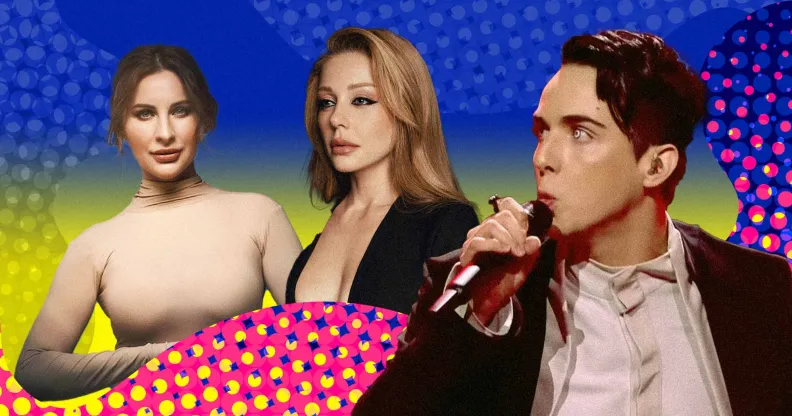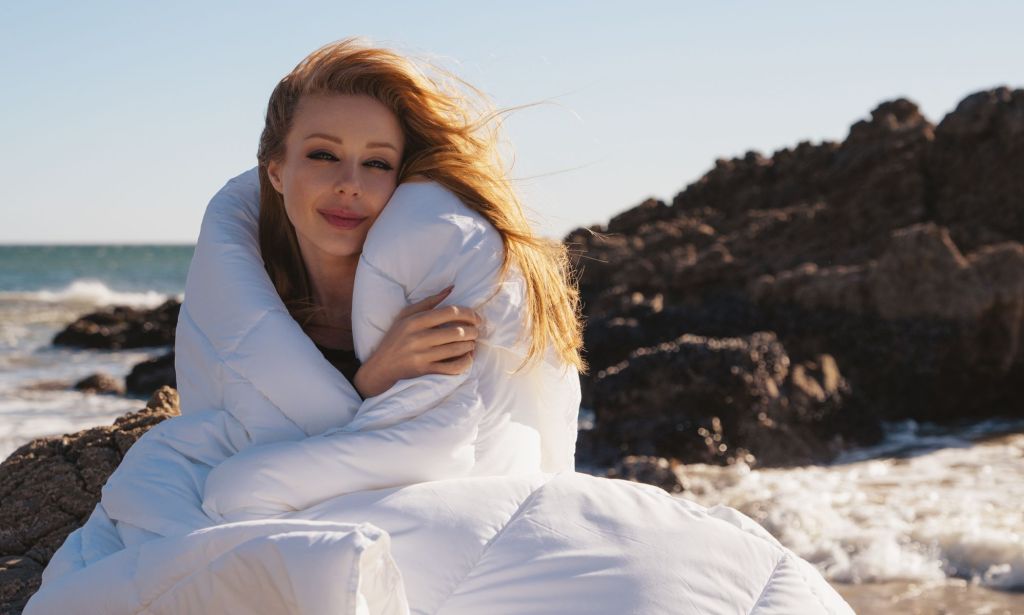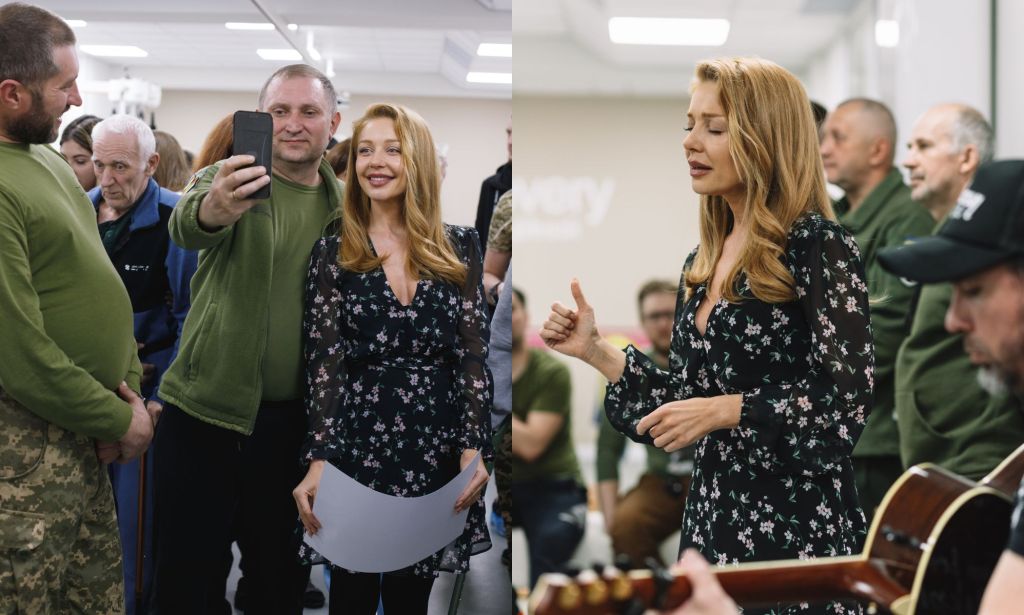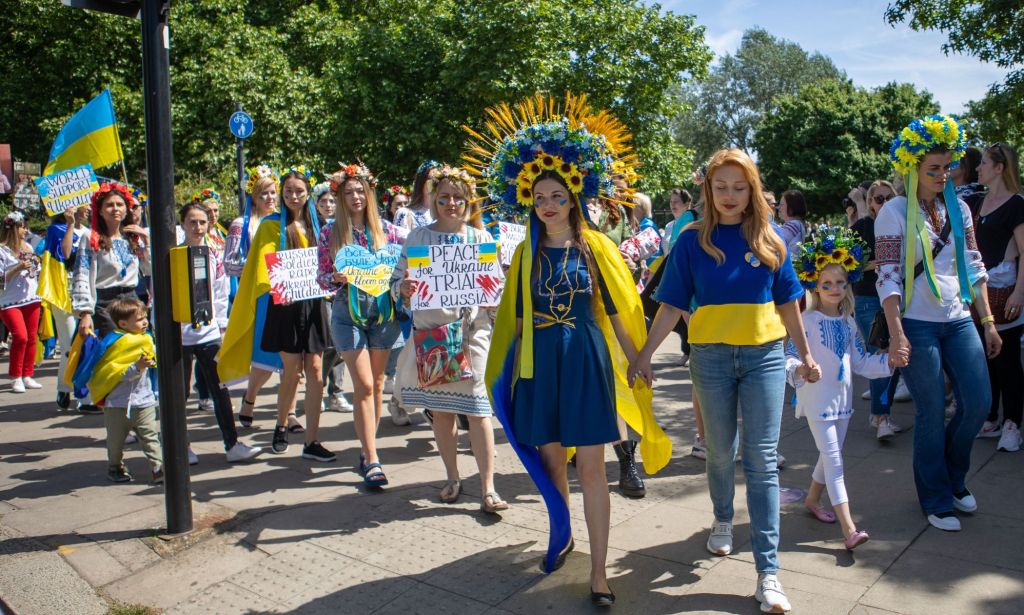Ukrainian pop royalty on why Eurovision 2023 matters: ‘This is a march of freedom’

Eurovision 2023 is a collaboration between the UK and Ukraine. (Supplied/Eurovision Song Contest)
When Ukraine’s Kalush Orchestra won the Eurovision Song Contest with “Stefania” last year, Europe roared with joy.
“That moment was historical because the saddest day came to Ukraine,” says Tina Karol, one of the country’s best-known singers. “When the people have a moment of joy, these are unbelievable feelings. Goosebumps. This is how the whole nation, in one second, feels joy.”
As the winning country, Ukraine should have hosted this year’s contest. But Putin’s invasion meant hosting responsibilities fell to last year’s runner-up, the UK. This year’s contest is an apt display of unity between the two countries.
Karol knows first-hand the power and unbridled joy that Eurovision can bring. In 2006, she came seventh while representing Ukraine with her song, “Show Me Your Love”. She entered the contest as an unknown performer, and, 17 years on, she’s released nine albums, mentored on The Voice Ukraine, judged Ukraine’s Eurovision selection process, become a cultural diplomat and been honoured by president Volodymyr Zelenskyy for her contribution to the country.
Since Russia’s invasion, she has travelled the world to raise awareness of the war.
At the Eurovision final, Karol will be part of the flag parade, performing a remix of “Show Me Your Love” for the first time in more than 25 years.
“This is my art front, and this is how I defended my country,” she says. “All people who will look at that broadcast, they really will understand the most important message: love will win. Ukraine will win. Freedom will win. Eurovision for me, this is a march of freedom.”
Still based in Ukraine’s capital, Kyiv, Karol has spent recent weeks preparing for her Eurovision performance, while sirens blared in the background. “Can you imagine this situation?” she asks, mournful. “This is very hard and broke our hearts. At the same time, [it is] huge motivation to be the best.
“I’m so grateful for that opportunity, that we have that stage, that we can perform on Eurovision, that we can defend our country that way and stand with Ukraine shoulder by shoulder.”

Musician Mélovin, who represented Ukraine at Eurovision in 2018 with his single “Under The Ladder”, has also made his way to Liverpool for this year’s contest, performing earlier this week at the city’s Eurovision village. His reason for being at Eurovision 2023 is twofold.
“I’m here to have fun,” he says, “and I want to use the popularity of Eurovision to remind that this is a battle of the civilised world with darkness.”
Before his Eurovision stint, the 26-year-old singer became famous in the country after winning The X Factor Ukraine in 2015. After coming out as bisexual in 2021, he shot to prominence as one of the country’s most famous LGBTQ+ people.
Since then, he’s been vocal in his support for LGBTQ+ equality in Ukraine, and vocal about Europe’s need to stand up against the war. Eurovision, he says, is a time to use music as a tool for unity across the continent.
“Eurovision proves that you can, even in the dark times, continue to sing and to create. With the help of this music, they can find their own path,” he says. “This is the perfect opportunity to reach many hearts of people. You can make people’s lives brighter … Ukrainian people love Eurovision so much.”
As Ukrainian rock star and this year’s Eurovision co-host Julia Sanina explained recently: “Last year and this year, Eurovision in Ukraine, it’s different for Ukraine. Eurovision was always huge for Ukraine, very serious, and these years we’ve felt enormous support of all the world.
“Lots of people were watching Eurovision last year from the bomb shelters or the basements because of the war, but they were still watching.”
Karol remembers seeing videos of Ukrainian defenders watching last year’s contest while hiding in holes in the ground. This year, Eurovision is a reminder that the war is still ongoing.

“[A few weeks ago] I was in a military hospital with our defenders. It was very sad,” she says. “I decided to come to them and sing without a microphone, just to give them joy, hope and lift up morale and emotions.”
Some of the men she sang to had lost limbs while on the frontline. “They are young boys, and they already can’t live a regular, normal life. I was full of tears.”
Singer-songwriter Natisa Gogol fled Kyiv with her son, two days after the Russian invasion, living in a car for five days. Now, she feels “absolutely new”, having made it to Prague, in the Czech Republic.
“My music, my project, absolutely changed now, because I am changed after the war,” she explains. “Earlier, [music] would be light, more easy. But now I feel more deep. My music is deeper.”
Her new single “Aesthetics” is dedicated to Ukraine’s LGBTQ+ population.
Eurovision, she feels, is an opportunity to show Ukraine’s power. “The main message should be sincere and should [come] from [the] heart. And Ukrainian people should show that we are powerful, and we have enough power.
“But it’s not only about Ukraine, it’s about [the] whole of Europe. And we need the support … you can’t do it all by yourself. You should do it together. That’s the main message in Eurovision and we hope that our people can show it.”
This year’s Ukrainian entrant is the electronic duo Tvorchi. Karol knows them well.
“I’m proud that finally that duo can represent our country. I am a fan of them. I always [say]: ‘You have to be on Eurovision, let’s go’.
“I’m proud that we will represent modern music, dance music from Ukraine, and [a] very progressive vision on a stage.”
As well as providing a platform for the frankly huge amount of musical talent Ukraine has to offer, Eurovision is also a symbol of the UK’s unity with the country in the face of Russian aggression.
“Britain helps Ukraine not just with words, but with real actions: with humanitarian aid, with military aid. This is very important because we did not start this war. We want to live in our country,” says Mélovin, adding: “Glory to Ukraine.”

And Karol adds: “For us, this is not just a great partnership. We are so thankful that you are hosting.”
Last May, she led the Mothers’ March for Ukraine in London, for the Ukrainian children who have been abducted and transported to Russia. She remembers looking behind her and seeing not just Ukrainian mothers, but hundreds of British mothers too, marching alongside them.
“This is when you feel that you’re not alone in that world. This is more than thankful. This is ‘I belong to you, and you belong to me’. This is love.”
The Eurovision Song Contest grand final takes place on Saturday (13 May) and airs on BBC1 from 8pm.

